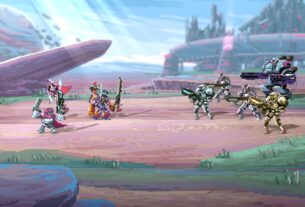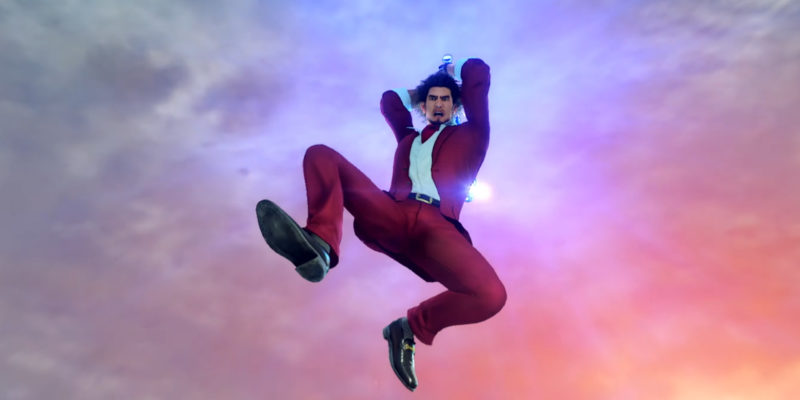
I’m not going to beat around the bush here: Yakuza: Like a Dragon is fucking great. Yes, I know, I should probably tease you and make you wonder so that you read all of the words. You should do that anyway because there are a few problems here, but the simple truth is exactly what I wrote above. Yakuza: Like a Dragon is a really, really good game.
It’s also one that’s been a long time coming. If you count the remasters, spin-offs, and Japan-only releases, there’ve been around 20 Yakuza games in the last 15 years, almost all of which have used the same eye-gougingly brutal, knee-to-the-crotch brawler combat system. It’s about time for a change, even if the change to a full-on JRPG is quite a genre switch. Doubly thankfully, Yakuza: Like a Dragon is a really good entry point to this sprawling series, with a new protagonist and no required knowledge of the series history. If you were put off by the combat but are into JRPGs, you can hop into this just fine.
Still, despite that huge change, Like a Dragon is still recognizably a Yakuza game. It has the open city, the side stories, the drippingly meaty crime story, and the utterly ludicrous humor. One moment you’re investigating a remarkably morbid criminal enterprise with all the horrifying drama that entails, and the next you’re using a person-sized vibrator to smash a trenchcoat-clad flasher into the pavement. Before going to play a round of golf or a mini-game that’s definitely not Mario Kart. So yeah. It’s Yakuza.
Still Like a Dragon, despite the changes
I’m not going to talk too heavily about the JRPG aspects, if only because I did that at great length in a separate article. What I will say is that, yes, this is a real JRPG. It has turn-based combat, a job/class system, crafting, and a whole slew of equipment. There’s levelling, HP and MP, and basically every other accoutrement you’d expect from even the most average JRPG.
Even this has its own Yakuza twist, though. To change classes, you actually need to visit the job center, and the classes themselves are at least vaguely associated with real jobs. You might have one party member as a bodyguard, another as a host, a third as an idol, while the fourth becomes a construction foreman.
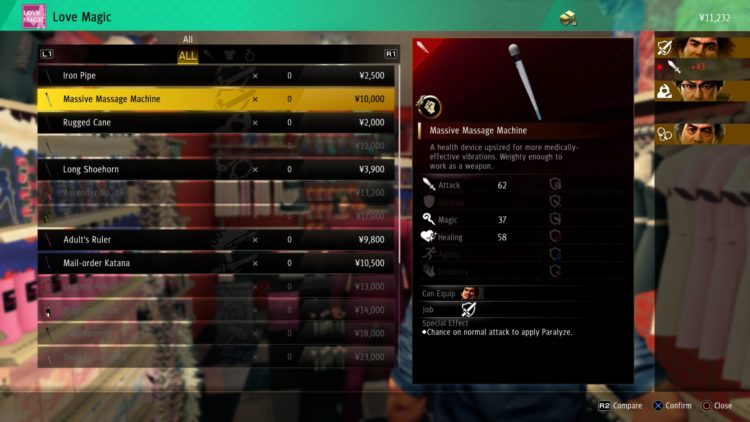
Just going into a sex shop to buy weapons. Like, uh, a “massage machine.”
They’re also remarkably silly. I wasn’t joking about the giant vibrator weapon before, but the “spells” are sillier than the weapons. To inflict ice damage and maybe give an enemy a cold or get them shitfaced (both status effects), then you might want a host or hostess to shake up a champagne bottle and spray it on your foes. Or perhaps they’ll slam a birthday cake into an enemy’s face with tank-busting force.
And that’s without getting into Homeless Guy, the base job of one of your party members which has elements of both white mage and black mage from more generic JRPGs. Aside from some healing, your Homeless Guy can… fling bread at an enemy, causing a swarm of pigeons to peck them. Some of this can be explained by the protagonist’s “gamer brain” (he loves Dragon Quest and sees everything in terms of that series, which is the in-universe explanation for allies and enemies changing form in combat, as well as so much else). But it’s still delightfully silly.
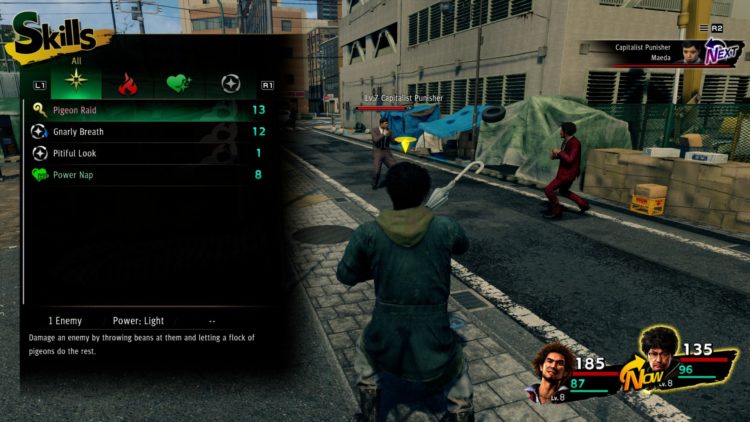
While that’s a huge change, it’s (and I’m going to write this a lot) still Yakuza. It’s turn-based, but characters still roam around while you’re choosing options. The environment matters, too; if objects are in the way, characters may kick them into enemies to inflict more damage, or even pick them up and use them as impromptu weapons. Basically, the combat still looks like Yakuza combat — it’s just controlled in a completely different manner.
Crime and punishment
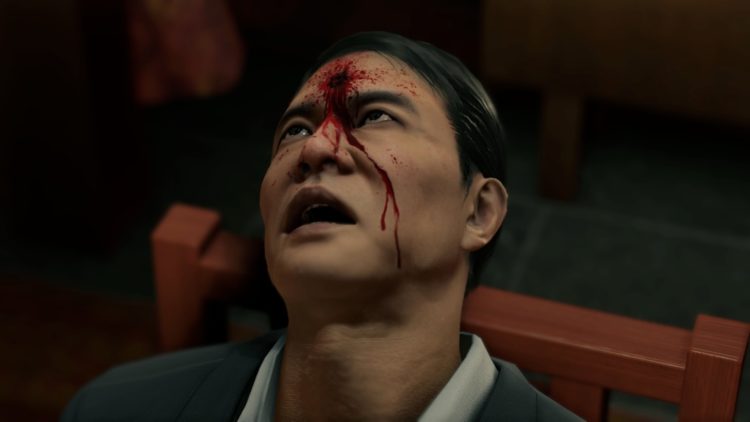
The opening sets the tone for the actual story. And it gets darker from here.
If you’re new to Yakuza and what stuck in your mind the most from the previous paragraphs was “person-sized vibrator”, “trenchcoat-clad flasher”, and “swarm of pigeons”, then you might be surprised that Yakuza: Like a Dragon… actually has a very serious, dramatic, and well-crafted story. One of Yakuza’s greatest (and weirdest) strengths is it manages to meld together its bizarre and slightly smutty humor with a fascinating, twisty, and genuinely emotional story. Like a Dragon doesn’t miss a step here. The main plot itself is a full-on crime drama, and an excellent one at that, with a strong cast of characters and understandable motivations on all sides, and a lack of the bloat that swallowed up Yakuza 4 and 5.
As a soft refresh of the series, Like a Dragon pulls a lot of its story beats from the very first Yakuza game. This isn’t a The Force Awakens-style rehash of the same story with a new cast, though. It’s more that it tips its hat to the original game in a number of ways, pulls from some of the primary story beats, and then takes things in its own direction.
Our protagonist here is Ichiban Kasuga, a low-level grunt in a small-time yakuza family. After a day of routine duties, he finds himself asked to make a pretty big sacrifice: go to prison for a murder he didn’t commit to protect the family. He’s released 18 years later to find a vastly changed world, and after a nasty betrayal, he finds himself on death’s door and homeless in the unfamiliar city of Yokohama.
A tangled web
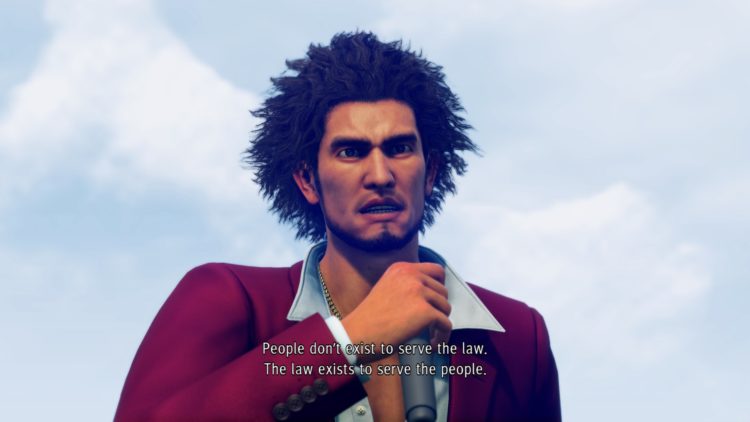
From there, Ichi’s tasks are clear. First, pull himself out of the gutter. Second, find out what happened to everything and everyone he knew during his time in prison, and figure out the reasons behind the betrayal. Naturally, things get more complicated from there. Yokohama is a city outside of the control of the huge yakuza factions and is instead held by the “great wall of muscle” — a precarious balance between three criminal organizations that prevents outside influences from getting in. And when that starts to crack and Ichi starts to run afoul of these organizations, things rapidly go from bad to worse.
There’s more to it than that, of course; there are twists and turns aplenty. Expect murder and betrayal, with both criminal gangs and politics in full force, while exploring what “family” really means. Interestingly, you can also expect a lot of social commentary and a fairly nuanced look at the “gray areas” of society: the homeless, the squatters, the immigrants, the sex workers. And this time around, it may end up being these “scum” of society that end up having to save the day.
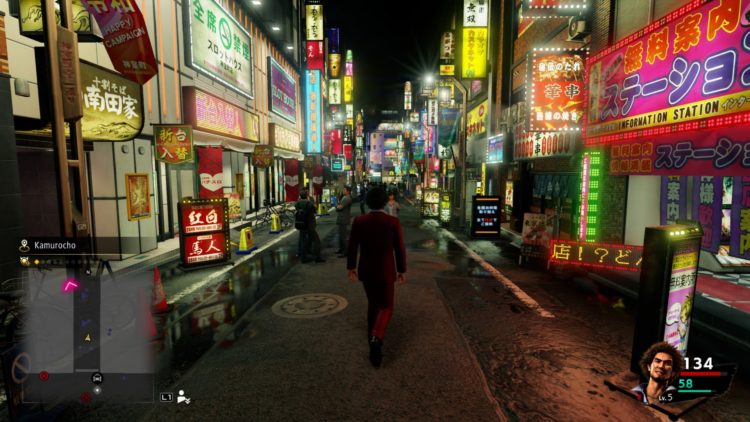
I want to give a particular shout-out to the English voice acting, too: the Japanese VO is predictably good, but almost every English voice is equally solid. I’m not a fan of a few, but both the big names like George Takei and the experienced voice actors do a solid job, with the dialogue and lip-syncing all changed to fit, with even the subtitles being different depending on if you’re playing with English or Japanese VO. The big question mark for me was how well it’d handle the big, climactic emotional moments… and the answer is “incredibly well.” The game gets dangerously tear-jerking towards the end, and no emotion is lost if you’re listening in English.
This time, crime pays
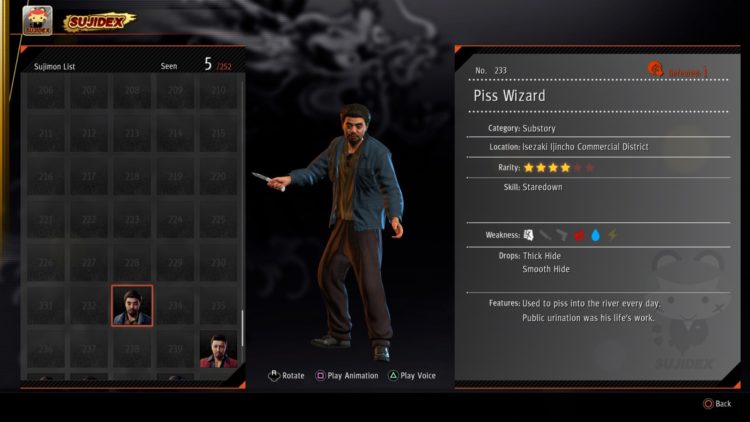
The Piss Wizard is definitely a Sujimon that’s probably more horrifying if he’s shiny.
All of this means that, right now, Like a Dragon is probably one of my favorite entries in the series. It’s not quite Yakuza 0, but it’s fresh, coherent, continually entertaining, and — again — it lacks a lot of the bloat that’s swallowed up some of the recent entries.
Its biggest issues come from its shift to being a JRPG, and I mostly put that down to Ryu Ga Gotoku Studio’s inexperience with that genre. There are mild frustrations aplenty, from some issues with inventory management to the minor annoyance of having to go back to job center to change jobs. Yakuza: Like a Dragon is also, for the most part, a tremendously easy game. There are two or three seriously nasty difficulty spikes (mostly against bosses who absolutely deserve to be brick walls for the unprepared) that require a spot of grinding, but otherwise you can breeze through the game. So yeah, the actual combat pacing is a little off, and post-game aside, those are also the only occasions you really need to care about having accessories and jobs that synergize well.
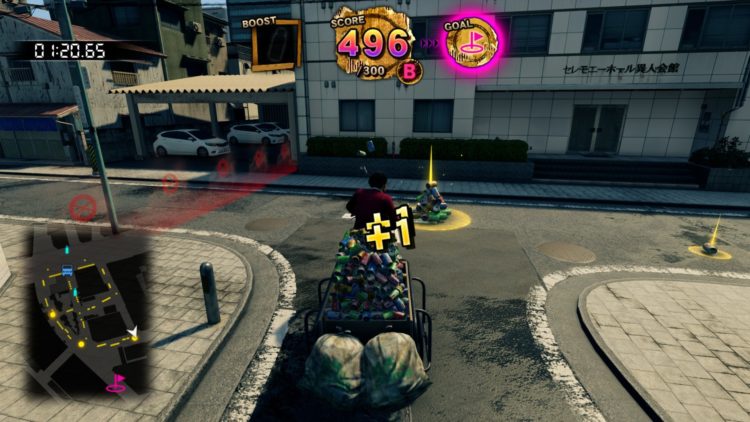
Take a break and grab some cans in this mini-game that definitely wasn’t inspired by Pac-Man.
But! But but but. This is, seriously, a minor complaint. After 85 hours of delving into the criminal underworld of Yokohama (while managing a company, handing spicy kimchi out to people, playing baseball, racing karts, and fighting off sleep sheep to stay awake during cinema trips) Yakuza: Like a Dragon has not disappointed at all. Ichi is a great new protagonist, distinctive from Kiryu and Takumi in his optimism and goofiness. The story and plotting are well-crafted, involving, and heart-rending. The combat is enjoyable, the puns are glorious, and the piss-takes of other JRPGs (right down to the bestiary being a “Sujidex” for “Sujimon”, or “men who make you super jittery”) are fantastic.
So, to go back to what I said at the very start? Yakuza: Like a Dragon is fucking great.
The first JRPG Yakuza game has some issues in execution, but nothing that amounts to more than a minor annoyance. This is a truly excellent revamp of the long-running series, and a superb starting place for newcomers.

